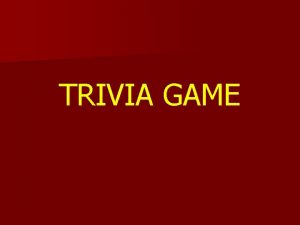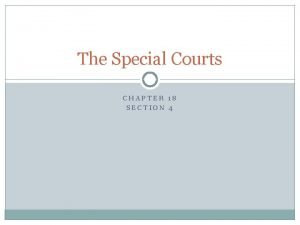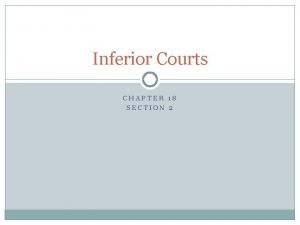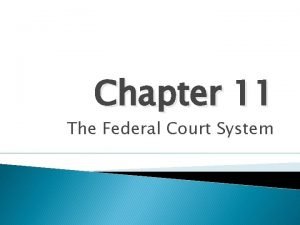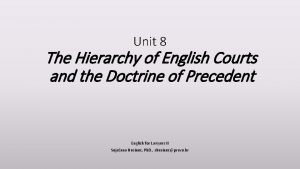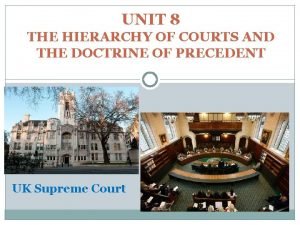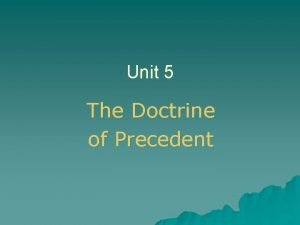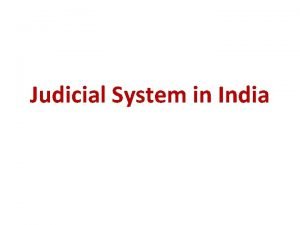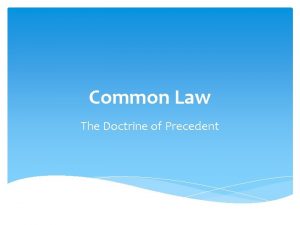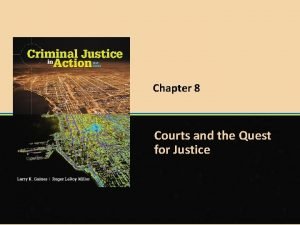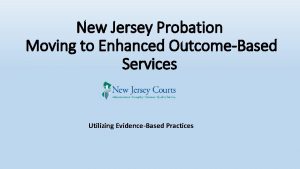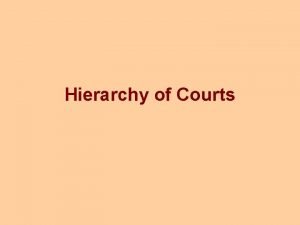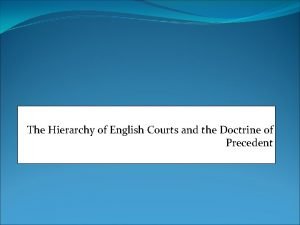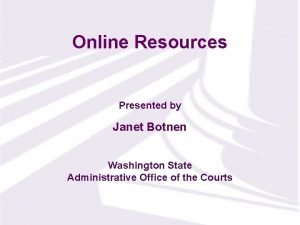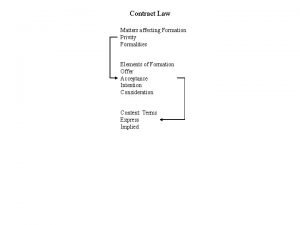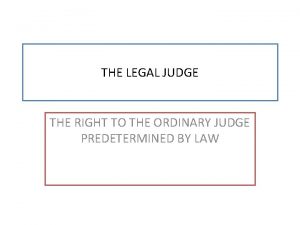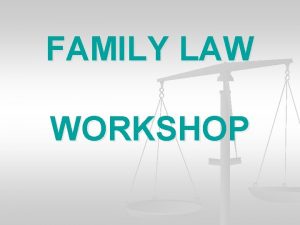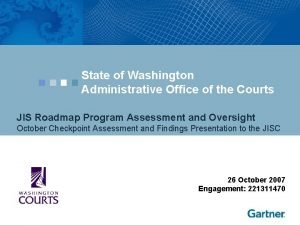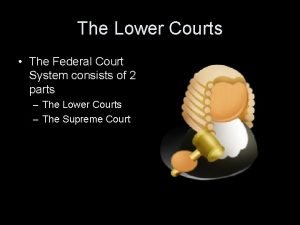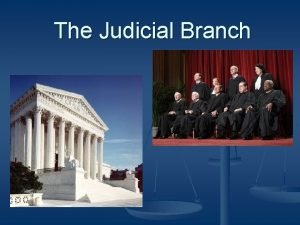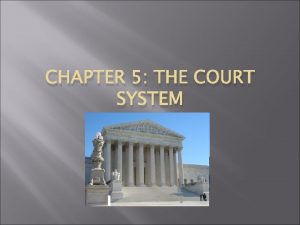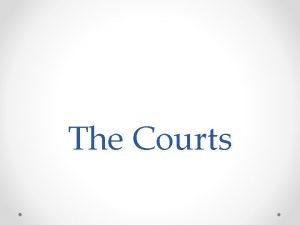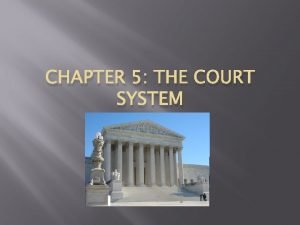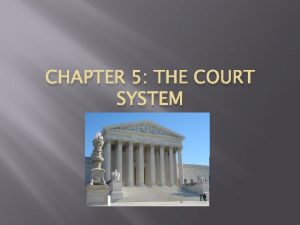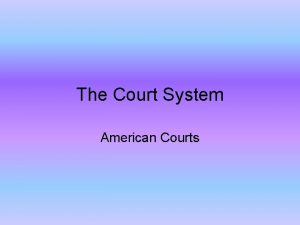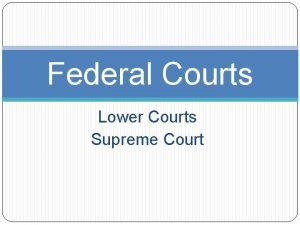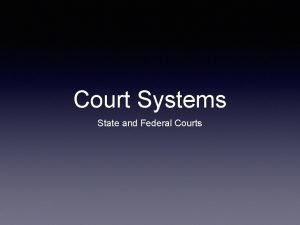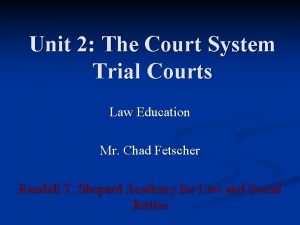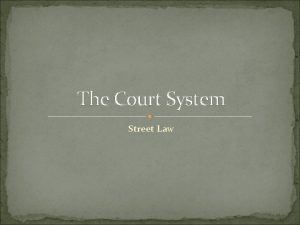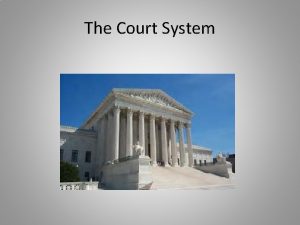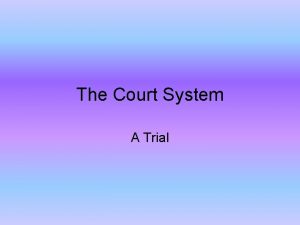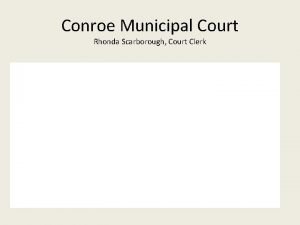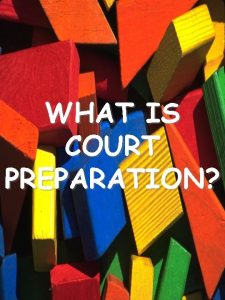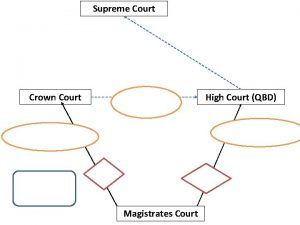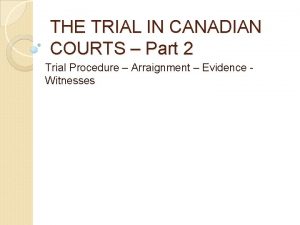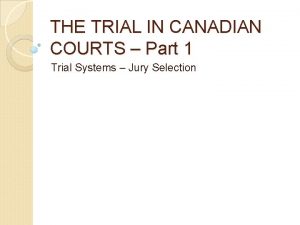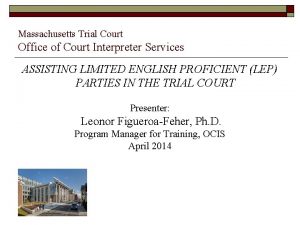CHAPTER 5 THE COURT SYSTEM Trial Courts Trial

























- Slides: 25

CHAPTER 5: THE COURT SYSTEM

Trial Courts Trial Courts: listen to testimony, consider evidence, and decide the facts in disputed situations

Trial Courts Adversarial System: allows opposing parties to present their legal conflicts before an impartial judge or jury Inquisitional System: a method for handling disputes in which the judge is active in questioning witnesses and controlling court processes

What does a Judge actually do? ? Judges - preside over the trial - make sure the attorneys follow the rules - instructs the jury on the law - can sentence individuals

Juries Remember the 6 th and 7 th amendments? To serve on jury you must…. Be a US citizen At least 18 years old Be a resident of the state Be able to speak and understand English

Juries It is our DUTY to complete jury service. Jury lists are complied from lists of registered voters and licensed drivers Convicted felons are ineligible for jury service unless their rights have been restored.

Juries Employers are required to give employees time off for jury service Courts pay jurors a small stipend One-day or One-trial Plan: Jurors must show up on the day they are called. If they are selected they must serve the duration of the trial

Juries Voir Dire: the screening process in which opposing lawyers question perspective jurors to ensure as favorable or as fair a jury as possible Removal for Cause: opposing attorneys may request the removal of any juror who appears incapable of delivering a fair, impartial verdict Peremptory Challenges: attorneys on opposing sides may dismiss certain jurors without a reason. (cannot be used to discriminate based on race)

Jury Selection http: //www. youtube. com/watch? v=fum 76 mlyl 7 s http: //www. youtube. com/watch? v=f 40 CZR 2 Fx 2 w&featur e=player_detailpage

Appeals Courts In an appeals court, one party presents arguments asking the court to review the decision of the trial court. No juries, no witnesses, no new evidence An appeal is only possible when there is a claim that the trial court committed an error in law: occurs when the judge makes a mistake as to the law in the case (ex: p. 52)

Appeals Courts Precedent: court decision that guides future cases with similar questions Majority Opinion: states the decision of the court Dissenting Opinion: written by judges who disagree with the majority opinion Concurring Opinion: written by judges who agree with the majority opinion but for different reasons

Federal Court Systems US Supreme Court US Court of Appeals US District Court (trial courts)

OH State Court System OH Supreme Court OH Court of Appeals Cuyahoga County Court of Common Pleas(felonies) Municipal Courts (misdemeanors) Example: Berea City Court

Federal Courts Congress has the power to create lower courts 70% of the cases filed in federal court each year are bankruptcy cases Federal courts hear about 1 million cases each year

Tribal Courts Indians still maintain some authority over their reservations. Family relationships Tribal membership Law and order on the reservation The federal court has the authority to hear felony cases committed on Indian reservations

International Courts International Court of Justice: set up by the UN, settles disputes based on international law International Criminal Court: tries individuals for crimes against humanity, war crimes, genocide

CHAPTER 6: LAWYERS

Lawyers = attorney Trial Lawyers are called litigators

When do you need a lawyer? Seeing a lawyer does not mean you are in trouble…sometimes you can consult a lawyer before trouble arises… Real estate Divorce, adoption Contracts accidents

How do you find a lawyer? Ask for a recommendation In 1977 the Supreme Court ruled lawyers could advertise If you cannot afford a lawyer you may be eligible for free legal assistance (public defender)

What do you need to ask about fees? How much does the lawyer charge per hour? How often will you be billed? Retainer: a down payment on the total fee Contingency fee: not per hour or lump sum; a percentage of whatever amount the client wins or settles for in the case (usually 1/3)

Working with your Lawyer You must be able to TRUST your attorney Attorney-Client Privilege: whatever you tell your attorney about your case is private and confidential Attorneys will give you advice, but YOU must make the final decisions. Legal Malpractice: the type of lawsuit brought against a lawyer for loss or injury to the client caused by the lawyer’s error or failure to meet acceptable standards of practice for the legal profession

Code of Professional Responsibility Canon 1: A lawyer should assist in maintaining the integrity and competence of the legal profession Canon 2: A lawyer should assist the legal profession in fulfilling its duty to make legal counsel available Canon 3: A lawyer should assist in preventing the unauthorized practice of law Canon 4: A lawyer should preserve the confidences and secrets of a client Canon 5: A lawyer should exercise independent professional judgment on behalf of a client.

Code of Professional Responsibility Canon 6: A lawyer should represent a client completely. Canon 7: A lawyer should represent a client zealously within the bounds of the law Canon 8: A lawyer should assist in improving the legal system Canon 9: A lawyer should avoid the appearance of professional impropriety.

Other Notes: A lawyer must pass an examination to become a member of a state bar Lawyers can be disbarred (no longer has a license to practice law) who violate the standards of conduct If you have issues with your lawyer, you can report the problem to your local or state bar association You can sue your lawyer for legal malpractice for serious errors that result in injury or loss.
 Judicial restraint clipart
Judicial restraint clipart Is there a basketball court above the supreme court
Is there a basketball court above the supreme court Chapter 18 section 4 the special courts worksheet answers
Chapter 18 section 4 the special courts worksheet answers Chapter 18 section 2 the inferior courts worksheet answers
Chapter 18 section 2 the inferior courts worksheet answers The federal court system chapter 11 answer key
The federal court system chapter 11 answer key Court hierarchy in uk
Court hierarchy in uk Hierarchy of uk courts
Hierarchy of uk courts Hierarchy of uk courts
Hierarchy of uk courts Wolverhampton tennis
Wolverhampton tennis Judicial hierarchy in india
Judicial hierarchy in india Hierarchy of courts in australia
Hierarchy of courts in australia 4 levels of state courts
4 levels of state courts Arizona fare payment
Arizona fare payment Courts hierarchy
Courts hierarchy New jersey courts
New jersey courts Jurisdiction of supreme court
Jurisdiction of supreme court English courts hierarchy
English courts hierarchy Inside courts wa
Inside courts wa When will the courts imply terms into a contract
When will the courts imply terms into a contract Ordinary courts
Ordinary courts O romeo romeo
O romeo romeo Maryland court hierarchy
Maryland court hierarchy Family law facilitator
Family law facilitator Washington administrative office of the courts
Washington administrative office of the courts Federal court system structure
Federal court system structure Us court system chart
Us court system chart

